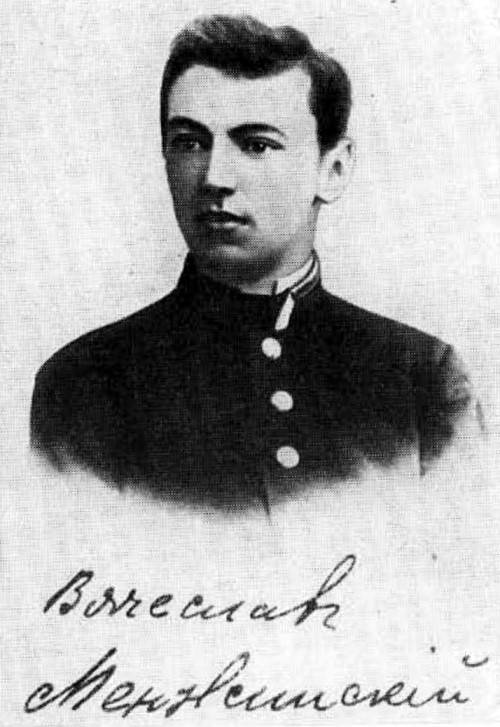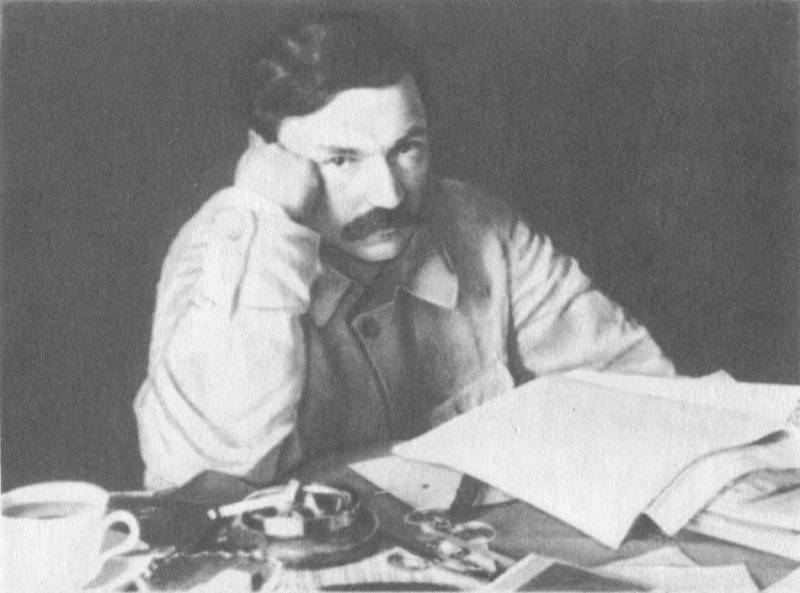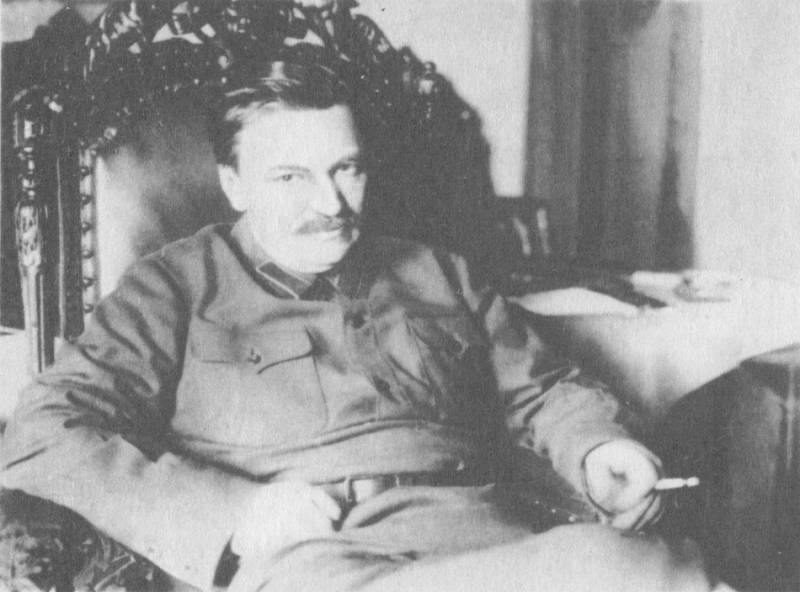Menzhinsky. The most intelligent security officer
Unlike the later leaders of the security organs, Menzhinsky was of noble origin. His father, Rudolf Ignatievich, belonged to a Polish gentry family who converted to Orthodoxy. He had the rank of State Counselor (in the army - above the colonel, but below the major general) and taught history in the St. Petersburg cadet gymnasium, the Corps of Pages and several other higher educational institutions. Maternal grandfather on the maternal line, Alexander Shakeev served as an inspector of the School of Cavalry Sub-ensigns and Junkers. Thus, Vyacheslav Rudolfovich Menzhinsky had a noble origin, which, up to a certain point, determined his life path.

In 1898, Vyacheslav Menzhinsky graduated from the Law Faculty of St. Petersburg University. Like many young people of that time, he was seriously carried away by revolutionary ideas and, being an educated man, he began teaching in the evening and Sunday schools for the working class. In 1902, Menzhinsky joined the ranks of the Russian Social-Democratic Labor Party. Around the same time Menzhinsky tried to practice and literary activities. He published the novel “Roman Demidov” in “The Green Collection of Poetry and Prose,” published in 1905, and then the story “Jesus. From the book Barabbas ", which was published in the anthology" Protalina ". For life Menzhinsky earned advocacy.
In February 1903, Menzhinsky was temporarily sent by the party to Yaroslavl, where he was a member of the Yaroslavl Underground Committee of the RSDLP. As a cover, Menzhinsky worked as an assistant to the ruler of affairs in managing the construction of the Vologda-Vyatka railway. As part of the Yaroslavl Committee of the RSDLP, Menzhinsky was responsible for military matters. He collected information about the Russo-Japanese War, analyzed it, and also participated in the publication of the opposition newspaper "Northern Territory". After the 17 Manifesto of October 1905 was announced, the constitutional democrats who published this newspaper decided to remove the Bolsheviks from its editorial board. Soon before the start of the 1905 revolution, Menzhinsky returned to the capital. He joined the military organization of the RSDLP in St. Petersburg. That is, already then Menzhinsky chose for himself one of the most difficult and dangerous areas of party work - the military department.
Like many other members of the revolutionary underground, in 1906, Menzhinsky was arrested. However, he did not stay in prison for long. Unlike many other ordinary "fighters of the revolution", Menzhinsky was lucky to escape from prison. He left the Russian Empire and soon showed up in Belgium, then lived in Switzerland and France. Abroad, Menzhinsky even found a good job, settling into the bank "Lyon Credit" - both good education and comrades-revolutionaries played their part.
After the February 1917 revolution, Vyacheslav Rudolfovich Menzhinsky, like many other prominent revolutionaries, returned to Russia. Since Menzhinsky had been engaged in military issues in the RSDLP for more than a decade, he was appointed to edit the Soldat newspaper. When the October Revolution began, Menzhinsky, as a member of the Petrograd Military Revolutionary Committee, was commissioned to the State Bank. In fact, he became the head of the emerging finance system of Soviet Russia, taking the post of Deputy Commissar of Finance. December 8 1917 Menzhinsky year included in the Cheka. Here also played a role and experience Menzhinsky in military and financial matters, and, last but not least, personal qualities. Contemporaries spoke of Menzhinsky as a very polite, but silent and gloomy man.
The undoubted advantage of Menzhinsky was his exceptional education, especially in comparison with many other leaders of the Cheka, the OGPU and the NKVD. Menzhinsky was a man with a pre-revolutionary classical university education, owned sixteen (according to other sources - nineteen) foreign languages, wrote his own prose, brilliantly versed in classical and modern literature. Neither Berry, nor Ezhov, nor Beria possessed these qualities. By the way, it was Menzhinsky’s intelligence that later became the target of attacks by political opponents - he was accused of not interfering with political repression, but turning the security forces into an instrument of political terror.
However, shortly after his appointment to the Cheka, Menzhinsky was transferred to diplomatic work - by the Soviet consul in Berlin. Given the complexity of the then political situation, this was a very serious appointment. And it testified that Menzhinsky was one of the few political figures of Soviet Russia who could represent her interests in Germany. Menzhinsky returned to work in the Cheka organs at the end of 1919 of the year - after arriving from Germany. Two years, from July 20 1920 to July 20 1922, Mr. Menzhinsky headed the Special Department of the Cheka. In his subordination was the Foreign Department of the Cheka, the foreign intelligence of Soviet Russia. Naturally, being in these positions allowed Menzhinsky to gain significant political influence in Soviet Russia. It was under the leadership of Menzhinsky that the Soviet Special Section and the Foreign Department of the Cheka were doing their first steps. After the 14 of January 1921 of the year, the Secret-operational administration of the VChK of the RSFSR was formed, Vyacheslav Menzhinsky was also appointed its head. When in February 1922 the State Political Administration of the NKVD of the USSR was created on the basis of the Cheka, Menzhinsky headed the Secret Operational Directorate of the GPU, and then the OGPU - the United State Political Administration.
In 1923, Mr. Menzhinsky became the first deputy chairman of the OGPU. By this time, he actually concentrated in his hands the management of the Soviet secret services, since “Iron Felix” Dzerzhinsky was busy with other important party and state affairs. When in February 1924 Dzerzhinsky headed the Supreme Economic Council and engaged in the management of the economy of the USSR, the leadership of the OGPU is almost completely taken over Menzhinsky. 20 July 1926, Felix Dzerzhinsky died of a heart attack. After his death, Vyacheslav Menzhinsky was officially appointed chairman of the OGPU under the Council of People's Commissars of the USSR. Under the leadership of Menzhinsky there was a further strengthening of the Soviet special services. It was at that time, when Menzhinsky headed the state security organs, the most serious changes were taking place in the political and economic life of the Soviet Union - the departure from the course of the new economic policy, industrialization and collectivization began, Stalin began to gradually remove from power his political opponents - Trotskyists, Zinovievites, Kamenevists and representatives of other party opposition groups. Naturally, the main burden on the fight against the opposition, with the counter-revolutionary organizations, with the nationalists in the Soviet republics fell on the security organs.
Under the leadership of Menzhinsky, a system of corrective labor camps was created, the prisoners of which began to be involved in the construction of various objects of the national economy. Under Menzhinsky, construction began on the White Sea Canal and the Moscow-Volga Canal. However, since the beginning of the 1930-s, Menzhinsky's health has seriously deteriorated. First, he suffered from asthma, and constant smoking did not help alleviate the disease. Secondly, the consequences of a car accident, which Menzhinsky got into while he was living abroad, also made themselves felt. Well, of course, the peripetias of Menzhinsky's personal life played their part. This silent and gloomy man, however, was a success with women. In the life of Menzhinsky there were three marriages. In 1925, his second wife, Maria Rostovtseva, passed away. Although Menzhinsky then remarried - to Alla Adovaya, his experiences seriously undermined his health. Menzhinsky suffered a heart attack and after that he felt bad. He even had to hold meetings of the management staff of the OGPU at home — the deputies and heads of departments and departments listened to their chairman, who was lying on the bed.
By this time, in the leadership of the OGPU, Heinrich Yagoda became one of the most sinister and controversial figures in Soviet history. Heinrich Jagoda made a dizzying security career. In the past, a member of the Nizhny Novgorod group of communist anarchists, Yagoda (the real surname and name - Enoch Yehuda) joined the Bolsheviks only in 1917 year. In 1918, he settled in the Petrograd Cheka, and at the end of 1919, he became the head of the Administration of the Special Department of the Cheka, and in September, 1923 - deputy chairman of the OGPU. When the OGPU left Ivan Akulov, who occupied in 1931-1932. the post of first deputy chairman of the OGPU, in fact, Yagoda turned out to be the real head of the Soviet security agencies. By this time, Menzhinsky had practically retired, although formally he retained the post of Chairman of the OGPU under the SNK of the USSR.
10 May 1934, Vyacheslav Rudolfovich Menzhinsky died on the sixtieth year of life. One of the most prominent figures of the Soviet special services of the early stage of their existence, died of illness. Soon after his death, the OGPU was renamed the Main Directorate of State Security of the NKVD of the USSR, and he headed it, at the same time, having received the post of People's Commissar of Internal Affairs of the USSR, Genrikh Yagoda. Subsequently, the death of Menzhinsky was used to convict Yagoda himself - he was accused of ordering, at the direction of the Trotskyists, to organize the wrong treatment of the chairman of the OGPU.
Menzhinsky managed to stay on the post of the head of the state security organs for eight years. Still the same time before that, he was actually the second person in the Cheka, the GPU and the OGPU. Speaking about the figure of Menzhinsky, one cannot overlook the fact that in fact it was to him that the Soviet state was obliged to form an extensive and very effective system of political counterintelligence. It Menzhinsky became the initiator of the "purification" of the Soviet state from all kinds of opposition and politically unreliable elements. At the end of the 1920s, when Menzhinsky was at the helm of the OGPU, both the non-communist and the communist opposition were practically destroyed in the Soviet Union. “Shakhty affair”, “The Work of the Industrial Party”, “The Affair of the Labor Peasant Party” - all these high-profile processes took place exactly during the leadership of Vyacheslav Menzhinsky. In those years when Menzhinsky was in charge of the security forces, the Basmac movement in Central Asia was virtually destroyed. At the same time, the all-round strengthening of the OGPU troops was taking place, and the system of vocational education of the security organs developed. The outlines and methods of work of the security agencies that Menzhinsky laid down were subsequently used by his successors, who led the Soviet special services in the 1930s — 1950s.
Another colossal merit of Menzhinsky for domestic intelligence services is the creation of an extensive system of Soviet foreign intelligence. It was at the time when Menzhinsky was at the head of the OGPU that Soviet intelligence reached the international level. The activities of the Soviet agents developed in almost all countries of the world that had significance for Soviet politics and economics. Soviet intelligence agents acted in the midst of “white” emigration, infiltrated counter-revolutionary organizations, extracted military and technological secrets in Western countries. This entire system was also established and strengthened by Vyacheslav Menzhinsky, who had his own impressive experience in foreign work - both a representative of the Bolshevik Party and the consul in Berlin. Unlike the leaders of the Soviet secret services of a later time - Yagoda, Yezhov, Abakumov, Beria - the name Menzhinsky was not tabooed during the Soviet era - the streets of Soviet cities, military schools, military units were named after him.


Information